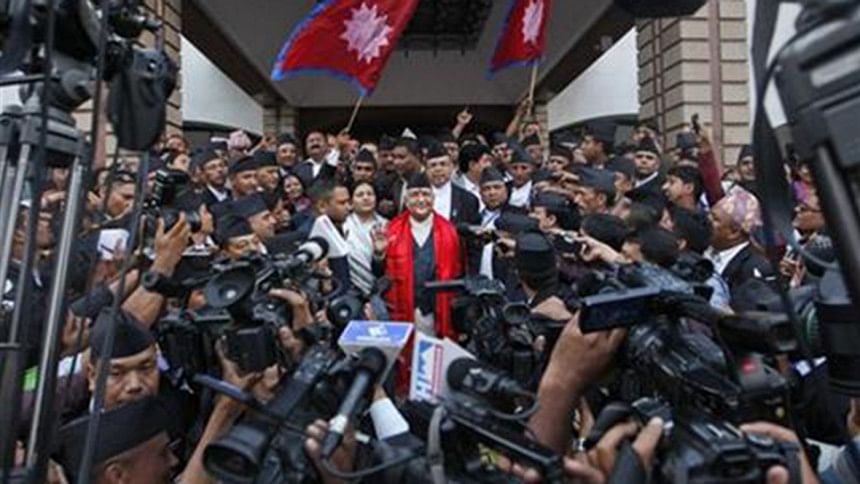Nepal elects Communist party leader new prime minister

Nepal's parliament elected Communist party leader Khadga Prasad Oli the new prime minister Sunday, thrusting him into the centre of daunting challenges, from ethnic protests over the new constitution that has also upset vital neighbour India to rebuilding from April's devastating earthquake.
Oli received 338 votes from the 597-member chamber, Parliament speaker Subash Nemwang announced. Oli defeated his predecessor Sushil Koirala, who received 249 votes.
Oli, 63, is generally popular in Nepal and has a reputation for being an outspoken leader who is not afraid to criticize. Some describe him with the phrase, "Oli ko goli," which means, "When Oli speaks he fires" (a bullet).
The leader of the Communist Party of Nepal Unified Marxist Leninist received the support of many smaller parties, including their rival United Communist Party of Nepal Maoist.
It is the first time that Oli has become the prime minister. He has served as deputy prime minister and ministers in previous governments. He suffers from a kidney illness and has had to make trips abroad for treatment to India and Thailand.
Oli and Koirala are leaders of the top two political parties and were coalition partners in the last government. Koirala became prime minister in 2014, but the constitution that was adopted last month required him to step down.
It was still undecided which other parties would join in Oli's new government.
He comes to power at delicate time, with ethnic Madhesis and other groups in the south protesting against the new constitution in riots that have left 45 people dead. India, which has close ties to the Madhesis, is also unhappy with the constitution.
The country is facing a severe fuel shortage, thanks to an unofficial blockade by India and Madhesis blocking a key border checkpoint. Fuel and cargo trucks have been stopped at the border since late last month, after the constitution was approved Sept. 20.
The constitution divides Nepal into seven new states, with some borders slicing through the Madhesis' ancestral homeland in the southern plains along the border with India. The Madhesis, along with several other small ethnic groups, want the states to be larger and to be given more autonomy over local matters.
Talks last week between the government and protesters made little progress.
Indian officials deny there is a blockade and say drivers are afraid to enter Nepal, but Nepali authorities say there is no trouble at many other border crossings.
Soon after the election, Indian Prime Minister Narendra Modi called Oli on the telephone, congratulated him and invited him to visit India, according to a tweet from Modi's office.
The conversation between the two men is the biggest positive development in recent days between the two South Asian nations. Modi has not talked to Nepali leaders in recent weeks mainly due to his travels to United States and other countries.
A statement issued by the Indian embassy in Nepal said Modi expressed the hope and expectation that Oli will support all sectors of society so that there is peace and stability in the country.
"We are confident that the Government of Nepal will address the remaining political issues confronting the country in a spirit of dialogue and reconciliation," the statement said, an apparent reference to the tension with the Madhesi.
Madhesi lawmaker Laxman Lal Karna, who participated in the voting for the prime minister in parliament, said they would continue their protests until their demands are met.
Oli also must lead the country as it rebuilds from the devastating earthquake that damaged hundreds of thousands of homes and killed thousands were killed. The disaster also damaged the tourism industry, which relies on Westerners to trek the mountain trails and climb the soaring peaks.
Oli's party, known to be a centre leftist group, has traditionally followed an economic system that combines both capitalism and socialism.

 For all latest news, follow The Daily Star's Google News channel.
For all latest news, follow The Daily Star's Google News channel. 



Comments